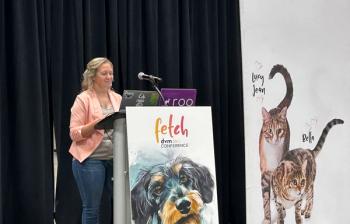
The making of a consumer
'Betty, call Junior. I think I want to start a dispensary.'
Thursday afternoon, summer of 1972; Castleton Veterinary Clinic Castleton, Ohio:
Gerald Johnson looked over Betty's shoulder and whistled softly. "That's a lot of driving," he murmured.
Gerald was young and single and had been out of school for just a few years. Betty, his receptionist, was a "townie" he hired right after he started his practice.
On his afternoon schedule were three routine events: Hog castrations at the Johansson farm; a dairy cow with a sore foot on the other side of the county and some calf de-worming at Jim Spence's cow/calf operation. All were good clients.
"I should be back to see some dogs and cats by 4 p.m. If I am late, just tell them to hold tight."
Gerald started to race out the door with boots and veterinary paraphernalia in tow.
"Don't forget the balling gun like you did yesterday," chimed Betty.
Gerald sneaked into the equipment room to get the balling guns just out of earshot — or at least he hoped so.
"I hear that," said Betty. "I knew you'd forget 'em." She laughed to herself.
Gerald gunned the old truck to the edge of the property and headed to the Johansson farm.
A little while later, Betty looked at the new radio equipment in front of her. A microphone attached with a curly wire to the newest acquisition of the practice. She knew how to use it and was grateful to be able to stay in contact with Dr. Johnson.
She keyed the microphone and turned down the squelch knob.
"Dr. Johnson, I have two calls: one from Dewey Davis and one from Al Bennett. Both say they have urgent problems. Dewey says one of his prize heifers is breathing heavy and 'lunging' again. He says you need to come right away. Al Bennett has some horses to worm and one seems to have the colic right now. Over."
The radio screeched and words came spilling out that were unintelligible. Betty turned another squelch knob and repeated herself.
"Did you hear my call? Over."
"You came in loud and clear," a weak voice dripped from the speaker. The voice was crackled, but Betty could make do.
"I am still on the other side of the county treating the sore foot. I won't be able to get back on that side of the county for a while."
"What do you want me to tell them?"
"Tell them I'll be out to their farms after supper. Also, go ahead and cancel any pets — I'll never make it."
"Ten-four."
After dinner, Dr. Johnson arrived at the Bennett farm and was whisked to the arena. Joby, a large Quarterhorse gelding, was lying on his side breathing heavily.
"He's been rolling since noon, Doc."
"Let's get him up so I can oil him and see what happens. I'll have to come back next week to worm the rest of them."
At 9 p.m., Dr. Johnson arrived at the Deweys' old and run-down farm property. In the fading twilight, he could see several cattle of mixed ages moving around in the fenced area behind the barn.
Dr. Johnson wondered how they managed to stay there, with most of the fence in very bad shape.
In the corner stood a young heifer with her head down and breathing very heavily. A short exam revealed pneumonia. Dr. Johnson pulled 45 ccs of oxytetracycline from his truck dispensary, gave it intravenously to the drooping heifer, then headed home exhausted.
Monday morning:
Betty looked at the note on her desk. It was from Dr. Johnson. The Bennett horse died over the weekend and so did Dewey's heifer. At the end of the note, he said to discount both bills because both animals died and he couldn't get there in time.
"It is just like Dr. Johnson. He'll kill himself running all over the county late into the night," she thought.
Betty looked up just as Junior Wilson opened the front door. He was the sales rep from Acme Veterinary Serum Co. and was looking for "Doc."
"Junior, I think Dr. Johnson will be here in just a few minutes."
"Tell him I got something great for his practice!" Junior exclaimed.
In a few minutes, Dr. Johnson walked in from the equipment room and stared at the day's schedule. It would be another doozy.
"Dr. Johnson, Junior is here and wants to talk to you," Betty said.
Gerald looked up and Junior was right there smiling as big as the man-in-the-moon."
Gerald gave an inward sigh and motioned Junior into his one exam room.
"Hey, Doc. Great news. Some of the other vets in my area are starting something different in their waiting rooms. It is called a dispensary unit. In it you can keep penicillin, vaccines and wormers. Think of it. You have total control and will make huge profits from farmers coming in from all over, getting their medicines directly from you. The other vets say it cuts down on the number of routine calls they have to make into the country."
Junior leaned over and whispered the next line:
"It might even make you rich."
"I doubt that," Gerald laughed. "But let me think about it."
"OK, Doc. Wouldn't want you to miss an opportunity."
As Gerald drove off to the next client farm, he had time to think.
He thought about Al Bennett's dead horse and about all the Dewey Davises in the world.
What Junior had said was starting to make sense.
Tuesday morning:
Gerald walked into the office with an unusually pronounced spring in his step. "Betty, call Junior. I think I want to start a dispensary."
Summer of 1992 Castleton Veterinary Clinic Castleton, Ohio
Gerald bit his lip and took a deep breath as he twisted his wedding ring off prior to surgery. He married Betty 12 years ago and continued to wear his golden band to work in spite of his gnarled hands.
As he scrubbed, he talked to his new hire, Jana, about the old days when he spayed dogs only once per week, on Tuesdays, and spent "thousands" of hours on the farm treating livestock. Gerald was still a fairly young man, had kids at home and still needed to pay off his mortgage and send the kids to college. His practice had become a small-animal practice out of necessity. Bottom line: He needed more income.
Betty walked in and said that Junior Wilson and another man were up front waiting. They said he should take his time.
Gerald pulled the endotracheal tube out of the mixed-breed puppy he had just spayed and gave Jana a checklist of things to look for if problems in recovery developed. He walked into the exam room, wiping his hands while greeting the two men.
Junior stood up and smiled ear to ear. He introduced Charles Adams from the front office. Junior had survived the reorganization of three veterinary drug companies. After subsequent job-title changes, he finally emerged as a regional sales manager for a conglomerate whose name bore no hint of its agricultural heritage.
Junior let Charles speak for the moment.
"Dr. Johnson, I am here to introduce a new program to our clients," he began.
"We are launching this program to help veterinarians nationwide increase profit share and gross margin in the growing pet market."
"He means you'll make more money," Junior chimed in.
"I am glad you explained that," Gerald thought to himself.
"Anyway, veterinarians all over are harnessing the power of the unused area in their waiting rooms to leverage all available floor space in their businesses."
"He means if you sell stuff up front, you will make money while you are napping over the noon hour," injected Junior.
Gerald thought for a moment. "What's the catch?" he asked.
"No catch. Why let the pet shops make all this money? That is where they really make their profits anyway. It is called point of sale. It's all about the psychology of the marketplace."
Junior threw open a large folder full of colorful illustrations.
"Look here — leashes, treats, toys and the whole ball of wax. When people come in to pay their bill, they won't be able to resist the items you will have for sale. There is plenty of room in your waiting room right now.
"And guess what? There are consultants going all over the country right now saying the time is right for vets to jump on the bandwagon," Junior intoned.
Junior also pulled out several photos of practices that had remodeled and added rooms to expand their services.
It was Charles' turn again. "We have an introductory package deal available right now for the next 30 days. It includes the shelving and enough supplies for six months. Reorder is a snap," Charles said.
Just then a sales contract appeared from nowhere.
Can I think about it?"
"Of course, but the company has made available a limited number of these packaged units. After next week, they might all be gone," Charles said in an urgent but decidedly more somber tone.
"Just $999 in three equal installments will get you started," Junior said.
Gerald thought a moment, hesitated but then signed the agreement.*
After the men left, Betty appeared from nowhere and gently moved toward her husband.
"What was that all about, Gerald?"
"Well, it looks like we are going into the retail business. We are going to put some displays up front and sell leashes and the like to our clients. We seem to have plenty of unused space in the waiting room."
Betty looked at her husband, sighed and after a brief silence spoke:
"The reason there is so much space in the waiting room is that you finally moved that miserable large-animal dispensary unit out into the barn nine years ago, remember?"
"Oh, yeah. I must have forgotten."
"Those who cannot remember the past are condemned to repeat it."
— George Santayana
("Life of Reason, Reason in Common Sense," Scribner's, 1905).
* Note: I do not blame the depth of consumerism completely on industry. In most cases, the root cause lies within the veterinary community itself. — dml
David M. Lane
Dr. Lane is a graduate of the University of Illinois. He owns and manages two practices in southern Illinois. Dr. Lane completed a master's degree in agricultural economics in 1996. He is a speaker and author of numerous practice management articles. Dr. Lane also offers a broad range of consulting services and can be reached at
Newsletter
From exam room tips to practice management insights, get trusted veterinary news delivered straight to your inbox—subscribe to dvm360.






